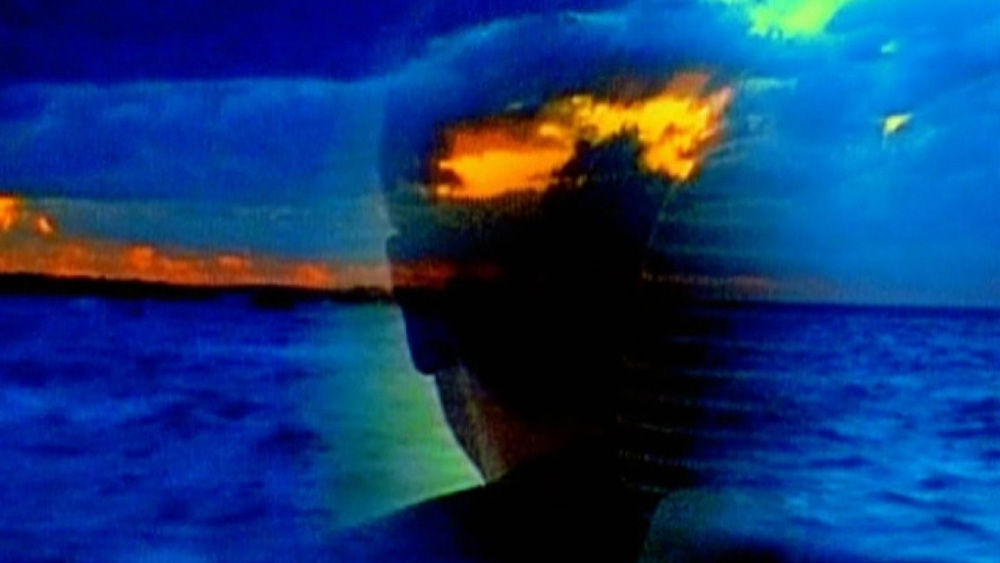Jean-Luc Godard’s In Praise of Love screened at the New York Film Festival in October 2001 at a moment of loss and crisis of heritage. The film’s seeming animosity toward the United States felt charged amid the rush to assuage in-group coherence. This September, during an election year and while our country prominently aids genocide overseas, a digital restoration of Godard’s perplexing film plays at L’Alliance New York. In a time marked by doubt in our democratic means, the film’s caricature of American industry is now perhaps more easily accepted as barter for a portrait of paralyzed French culture. But more than these dubiously successful portrayals, In Praise of Love relays an ambivalence toward its own historical context—an iciness its characters find themselves stunned by.
It is easy to make fun of the film’s protagonist, Edgar (Bruno Putzulu), who bumbles around Paris in the name of a “project.” He has not yet decided whether to write a novel, a play, or an opera, but professes interest in the French Catholic Resistance. He clings to the specter of the philosopher and Resistance devotee Simone Weil. Then there is Berthe (Cécile Camp), a contemporary stand-in, perhaps, of Weil, whom Edgar follows in hopes of casting. Berthe seems like a mouthpiece for European exceptionalism when she tells two Americans: “Poor you! With no history, you have to seek it elsewhere, in Vietnam, in Sarajevo...”
But it is in this soft hypocrisy, a simultaneously nascent and dilapidated way of relating to the world, that the film locates its methods. The first hour, shot in black-and-white 35mm, is so dark as to seem unlit. Its Parisian street-scapes are accompanied by a lullaby of literary quotations passed between characters. The final third, set in Brittany and shot with the flat vibrancy of DV, is equally without event. The arrival of the American “Spielberg Associates,” traveling via convertible and helicopter to purchase the story of Berthe’s family in the Resistance, is passed over by glancing wide shots. Gone are the hysterical destructions of expensive vehicles typical of New Wave Godard. Here, the potency of commodity appears to have acquiesced to nodes of global relation, such as “Hollywood,” that can be disapprovingly represented, but not blown up. The soft, intermittent piano theme is similarly melancholic.
The broad textures of the film sync with the cultural zombification of its characters. Still, elements of In Praise of Love surprise. In Brittany, refusing to heed ambiguities preceding World War II, Edgar talks over an elderly interviewee’s account of co-influence between French and Anglophone culture. In this scene, among others, it seems that pre-recorded speech has been laid over sync-sound performances to simulate interruptions. Here, the off-screen Breton’s account unfolds against Edgar’s narrow questioning. Eventually, Edgar’s speech also becomes a soundbite: “I am writing a cantata on Simone Weil,” comes his voice repeatedly on a different track.
Balancing the collages, screen-tests for Edgar’s project early on present the most focused moments of the film. Reminiscent of the frank interviews in Krzysztof Kieslowski’s short Talking Heads (1980), these close-ups on faces convey a willfulness in expression. Edgar pretentiously asks a middle-aged actor, “Do you ever think about death?” “Yes,” she responds. “I mean, your own death?” “No,” she says. He makes her read from a prisoner’s diary prior to his execution at the Liberation. She starts a sentence and he shuts her down: “Learn how to read, Madam. Or recite. Or learn how to listen.” The muddled aims of the director—Edgar as an extension of Godard—are marked by the hints of surprise, confusion, and defiance that flicker across Madam’s face on-screen.
In Praise of Love screens tomorrow evening, September 10, and on September 12, at L’Alliance New York as part of the series “Version Restaurée / Restored Version.”



